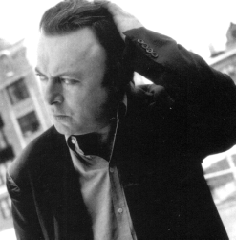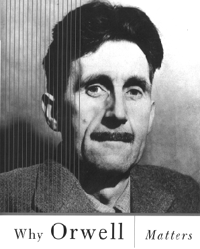 Call me a pessimist, but I once hurled a copy of Wallace Stegner's novel Crossing to Safety across a room because I simply could not believe the good fortune of its characters. A maxim when writing fiction: readers will readily accept events that spell disaster for characters, but will question anything that turns events to their favour. Stegner's novel, set partly in the 1930s, tells of an earnest but apparently poverty-stricken university scholar who seeks permission from his true-love's parents for her hand in marriage. They refuse, because he shows no means of support, but when he discloses he is actually extremely wealthy (a secret kept to test her love) they happily consent. That's when the book flew. Readers will, I'm afraid, insist that to be true-to-life, all fictional battles be hard won.
Call me a pessimist, but I once hurled a copy of Wallace Stegner's novel Crossing to Safety across a room because I simply could not believe the good fortune of its characters. A maxim when writing fiction: readers will readily accept events that spell disaster for characters, but will question anything that turns events to their favour. Stegner's novel, set partly in the 1930s, tells of an earnest but apparently poverty-stricken university scholar who seeks permission from his true-love's parents for her hand in marriage. They refuse, because he shows no means of support, but when he discloses he is actually extremely wealthy (a secret kept to test her love) they happily consent. That's when the book flew. Readers will, I'm afraid, insist that to be true-to-life, all fictional battles be hard won.
A similar rule applies to polemical biographies, such as those written by political commentator Christopher Hitchens. When delivered the muck, readers will readily accept that some supposedly heroic or charmed public figure, such as Mother Theresa or Bill Clinton (both of whom Hitchens has eviscerated in print), is actually a parasite or psychopath. But portray someone¨anyone¨as a saint, or worse, gloss over, and apologize for, their flaws to glorify them, as Hitchens has done in his new book, Why Orwell Matters, and you will suffer a very cynical reception.
I use the battle metaphor above purposefully. Although Hitchens lives in Washington D.C., he is a Brit, and this book's title, as published in Britain, was Orwell's Victory. As too often happens, Canadians must read an edition retitled for the American market. It makes for slightly confusing reading, because fundamentally Hitchens is not arguing why George Orwell matters. In fact, he goes as far as to say that, in some respects, Orwell doesn't matter anymore, since the Cold War, central to his life and oeuvre, is finished.
What Hitchens does try to do here is play champion to Orwell, targeting each of his detractors, old and current, to show how his legacy reigns victorious over those who would attack it. He is only partly successful.
"The disputes and debates and combats in which George Orwell took part are receding into history," writes Hitchens, "but the manner in which he conducted himself as writer and participant has a reasonable chance of remaining as a historical example of its own." Hitchens, of course, means a good example, but such was not always the case.
Devoting a chapter to each of his targets, Hitchens attacks in characteristic acerbic style. For instance, in the chapter "Orwell and the Left", he meticulously dissects semantically and factually specious anti-Orwell arguments made by Leftists such as Edward Said, Salman Rushdie and Raymond Williams, a prominent British Communist of the 1930s and 40s, to whom Hitchens attributes a "resentful sub-literate attitude." Hitchens shows that while Orwell's perspective was predominately Socialist, he was no ideologue, and unlike the blindly Stalinist Williams, he worked admirably in the interest of "the free-thinking individual."
In the chapter "Orwell and the Right", Hitchens answers the Left's claim that, with the anti-totalitarian novels Animal Farm and Nineteen Eighty-Four, Orwell was "giving ammunition to the enemy." Hitchens analyzes Orwell's critiques of American Cold War architect James Burnham, to show that Orwell's later work was as equally concerned with condemning American imperialist policies as it was with damning Communist tyranny. Hitchens also rescues Orwell from "body-snatching" neo-con revisionist Norman Podhoretz, who, it is shown, intentionally misinterpreted Orwell's work to use as anti-Soviet propaganda.
These chapters, and others on Orwell's distaste for empire, on his supposed "Englishness" and on how he might have experienced America, are the most insightful and successful in the book. What Hitchens shows here is that Orwell was determinedly individualistic, and that he fought adamantly against totalitarianism in many of its forms¨fascist, Stalinist, imperialist. These struggles do indeed stand as good historical examples.
 Where Orwell fell down, and where Hitchens follows him into the dirt, is in matters of sexuality and gender. For example, except for some dismissive asides and a few pages of cagey speculation about Orwell being a repressed homosexual (as if to suggest that "membership has its privileges") Hitchens does little to address homophobic statements made by Orwell, such as when he famously called Stephen Spender and W.H. Auden "pansies", or referred to homosexuals as "nancy-boys" in the book Down and Out in Paris and London.
Where Orwell fell down, and where Hitchens follows him into the dirt, is in matters of sexuality and gender. For example, except for some dismissive asides and a few pages of cagey speculation about Orwell being a repressed homosexual (as if to suggest that "membership has its privileges") Hitchens does little to address homophobic statements made by Orwell, such as when he famously called Stephen Spender and W.H. Auden "pansies", or referred to homosexuals as "nancy-boys" in the book Down and Out in Paris and London.
Regarding Orwell's attitudes towards women, Hitchens is somewhat more forthright. Citing authors such as Beatrix Campbell, Deirdre Beddoe and Janet Montefiore, he details the list of feminist complaints against Orwell. They argue, Hitchens states, that Orwell depicted virtually all of his female characters as stupid and/or egotistical and/or servile, that he objectified women's bodies in print and that he gave little consideration to female workers. Hitchens himself draws our attention to Orwell's "revulsion for birth control and abortion." All of this is, at the very least, reasonably verifiable, yet although it is widely recognized that women face social conflicts unique to their sex, Hitchens answers these charges by arguing that Orwell's portrayals of working-class struggles, which were overwhelmingly sympathetic to males, were universal. Furthermore, Hitchens astoundingly attempts to apologize for Orwell by surmising that he "liked and desired the 'feminine' but was somewhat put on his guard by the 'female'," which to me seems exactly the point.
Few intelligent, unprejudiced people would call these attitudes good historical examples. Indeed, history tells us that totalitarianism reserves a distinctly hideous corner for homosexuals and women, and while it is believable that Orwell's attitudes might have matured had he seen the second half of the 20th century, there is scant evidence that such issues were encompassed by his consciousness, or conscientiousness.
I am a great admirer of much, though not all, of Orwell's work. Many of his essays, as Hitchens duly points out, are amongst the most insightful works of political observation we have, as are Animal Farm and Nineteen Eighty-Four. But his early novels, especially Keep the Aspidistra Flying, were mediocre works that failed, an opinion shared by Orwell himself who tried to suppress even posthumous publication of these books. And his dismally narrow attitudes about sexuality and gender were hopelessly products of his time.
The point is that Orwell, while honourable in many vitally important ways, while "victorious" in intellectual battles against some of humanity's most heinous creations, was not perfect.
Until now, I have also been a great admirer of Hitchens' work. His books on Clinton and Kissinger are brilliant, concise and explosive polemics. His recent resignation from the Left-wing magazine, The Nation, where for 20 years he wrote a biweekly politics column, is a tremendous loss to journalism. (One doubts his Vanity Fair gig will fill the void.) To be fair, Why Orwell Matters is not a fully gushing tribute. One never feels the urge to hurl it across the room. The book is the product of voracious reading, including Orwell's collected works, recently published in 20 volumes, and it shows that Hitchens may well know as much about Orwell as is feasible. (Orwell's infamous list of possible Soviet spies, Hitchens informs, remains an "official secret" in British government files.) Unquestionably, there is an abundance of balanced and minutely nuanced study here and Hitchens does extremely valuable work in clearing away much dead wood to return one of the 20th century's most important writers and thinkers to the light of day.
But Hitchens' unwillingness to allow George Orwell his failings, his unwillingness to allow Orwell his lost battles¨with homophobia, with sexism, with his few reactionary veins¨in short, Hitchens' unwillingness to allow Orwell his flawed humanity, is itself a flaw that marks this book as Hitchens' least successful venture. Indeed, such myopic obsequiousness¨an error the highly principled Orwell would likely have censured¨smacks of dishonesty, creating a double-standard that ironically, and sadly, dilutes the credibility of Hitchens' book by pushing it, at least partly, into the realm of the Orwellian. ˛